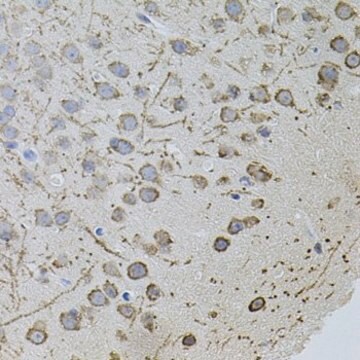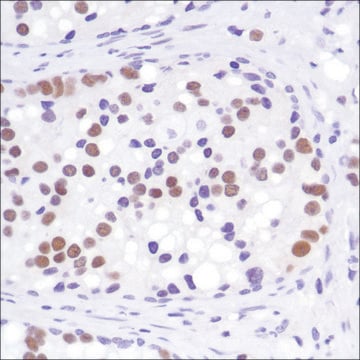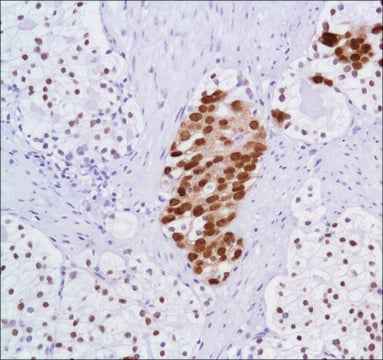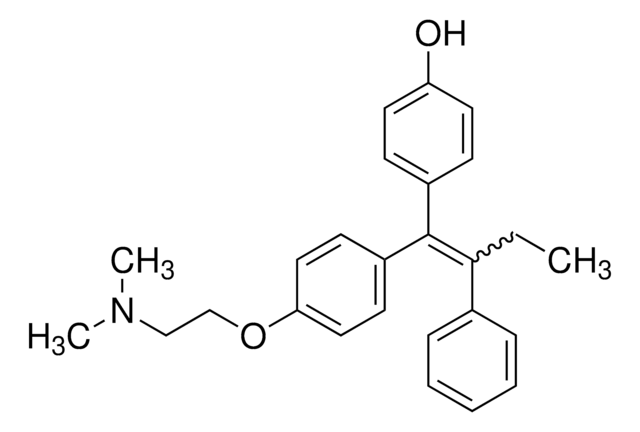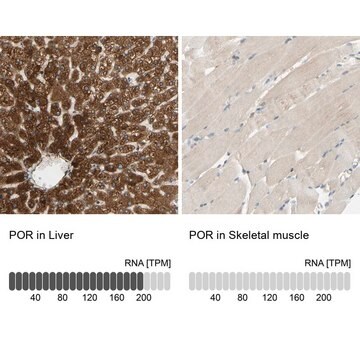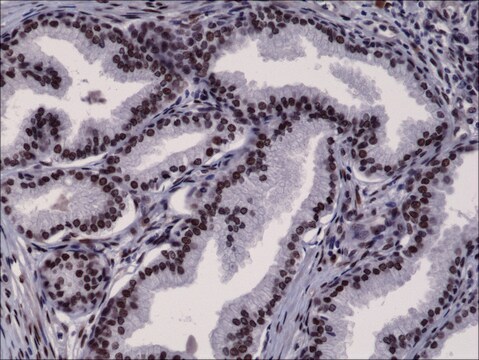추천 제품
생물학적 소스
rabbit
Quality Level
결합
unconjugated
항체 형태
affinity isolated antibody
항체 생산 유형
primary antibodies
클론
polyclonal
양식
buffered aqueous solution
분자량
antigen 110 kDa (additional band may be observed at 45 kDa)
종 반응성
rat, human
기술
immunohistochemistry (formalin-fixed, paraffin-embedded sections): 20-40 μg/mL using microwave-pretreated human prostate tissue sections
immunoprecipitation (IP): 5-10 μg using human MCF7 cell lysate ( 250 μg)
microarray: suitable
western blot: 1-2 μg/mL using whole extract of rat brain
UniProt 수납 번호
배송 상태
dry ice
저장 온도
−20°C
타겟 번역 후 변형
unmodified
일반 설명
Androgens are the male sex hormones that exert biological and transcriptional effects on binding to nuclear androgen receptor (AR). Androgens in humans include androstenedione, testosterone, dihydrotestosterone and dehydroepiandrosterone. Androgen receptor is a ligand inducible nuclear receptor, expressed on brain, bone, skeletal muscles, genital organs, hair follicles and cardiovascular tissue. On binding androgen, the AR is internalized and modulates the transcriptional of target genes. Additionally, AR also exerts extra-nuclear actions wherein it rapidly induces signalling cascades of MAPK and protein kinase C. The regulation by AR results in irreversible sexual differentiation of sex organs during embryogenesis and development of sex-specific characteristics during puberty
Anti-Androgen Receptor specifically recognizes the human androgen receptor protein (110 kDa). An additional band may be observed at 45 kDa. The antibody cross-reacts with rat androgen receptor.
Anti-Androgen Receptor specifically recognizes the human androgen receptor protein (110 kDa). An additional band may be observed at 45 kDa. The antibody cross-reacts with rat androgen receptor.
특이성
The antibody cross-reacts with androgen receptor from rat.
면역원
evolutionally conserved peptide corresponding to amino acids 1-21 of the human androgen receptor. This sequence is not found in estrogen, progesterone, or glucocorticoid receptors.
애플리케이션
Anti-androgen receptor antibody may be used for immunoblotting using whole rat brain extract at a recommended concentration of 1-2 μg/ml. For immunoprecipitaion from 250 μg of human MCF7 cell lysate, a concentration of 5-10 μg may be used. Immunohistochemistry may be performed on paraffin-embedded human prostate tissue sections at a working antibody concentration of 20-40 μg/ml.
Applications in which this antibody has been used successfully, and the associated peer-reviewed papers, are given below.
Western Blotting (1 paper)
Western Blotting (1 paper)
Rabbit anti-androgen receptor (C19) was used in a EMSA (electrophoretic mobility shift assay) which produced a supershift in the molecular weight of a particular DNA sequence indicating binding of the androgen receptor.
물리적 형태
Solution in 0.01 M phosphate buffered saline, pH 7.4, containing 15 mM sodium azide.
면책조항
Unless otherwise stated in our catalog or other company documentation accompanying the product(s), our products are intended for research use only and are not to be used for any other purpose, which includes but is not limited to, unauthorized commercial uses, in vitro diagnostic uses, ex vivo or in vivo therapeutic uses or any type of consumption or application to humans or animals.
적합한 제품을 찾을 수 없으신가요?
당사의 제품 선택기 도구.을(를) 시도해 보세요.
Storage Class Code
10 - Combustible liquids
WGK
WGK 2
Flash Point (°F)
Not applicable
Flash Point (°C)
Not applicable
개인 보호 장비
Eyeshields, Gloves, multi-purpose combination respirator cartridge (US)
이미 열람한 고객
Laura H Porter et al.
The Prostate, 79(11), 1326-1337 (2019-06-19)
Serially transplantable patient-derived xenografts (PDXs) are invaluable preclinical models for studying tumor biology and evaluating therapeutic agents. As these models are challenging to establish from prostate cancer specimens, the ability to preserve them through cryopreservation has several advantages for ongoing
D Orlic et al.
Proceedings of the National Academy of Sciences of the United States of America, 98(18), 10344-10349 (2001-08-16)
Attempts to repair myocardial infarcts by transplanting cardiomyocytes or skeletal myoblasts have failed to reconstitute healthy myocardium and coronary vessels integrated structurally and functionally with the remaining viable portion of the ventricular wall. The recently discovered growth and transdifferentiation potential
Qing Xie et al.
The Journal of biological chemistry, 292(33), 13521-13530 (2017-07-07)
NK3 homeobox 1 (Nkx3.1), a transcription factor expressed in the prostate epithelium, is crucial for maintaining prostate cell fate and suppressing tumor initiation. Nkx3.1 is ubiquitously expressed in luminal cells of hormonally intact prostate but, upon androgen deprivation, exclusively labels
Urmila Santanam et al.
Genes & development, 30(4), 399-407 (2016-02-18)
Understanding new therapeutic paradigms for both castrate-sensitive and more aggressive castrate-resistant prostate cancer is essential to improve clinical outcomes. As a critically important cellular process, autophagy promotes stress tolerance by recycling intracellular components to sustain metabolism important for tumor survival.
N Yadav et al.
Minerva urologica e nefrologica = The Italian journal of urology and nephrology, 64(1), 35-49 (2012-03-10)
The embryonic development, growth and maturation of the prostate relies on androgens, the male sex steroids, acting through their cognate receptor, the androgen receptor (AR). This dependence on androgens continues in adult life, where AR signaling remains necessary for the
자사의 과학자팀은 생명 과학, 재료 과학, 화학 합성, 크로마토그래피, 분석 및 기타 많은 영역을 포함한 모든 과학 분야에 경험이 있습니다..
고객지원팀으로 연락바랍니다.
